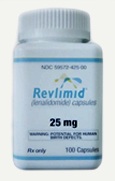 |
| Courtesy of Celgene |
Celgene ($CELG) is working to expand its portfolio of drugs, but for now its growth is primarily driven by extending the uses of its megablockbuster Revlimid, which made up 66% of its revenues last year. As successful as the myeloma drug has been, Celgene has run into some hurdles and the U.K.'s NICE is again questioning its cost vs. benefit for certain patients.
The cost watchdog group Friday issued draft guidance recommending against adoption of Revlimid for patients whose multiple myeloma has relapsed after receiving a treatment with Janssen's Velcade and who cannot take thalidomide and for whom bone marrow transplantation is inappropriate. It said the data presented was not clear as to whether using Revlimid would be as effective as trying Velcade again. But NICE said it was open to reconsideration if Celgene could make a more compelling case.
"We hope that the manufacturer, Celgene, will look again at their submission," NICE chief executive Sir Andrew Dillon said in the guidance. He pointed out that since the drug was recommended in 2009 for a different subset of patients, there have been no clinical trials done to show how Revlimid stacks up against other treatment options for these patients. "Celgene only presented robust trial data comparing lenalidomide to a placebo, not to other chemotherapies and there is very little evidence in the population we are currently appraising this drug for," Dillon said.
These kinds of back and forth exchanges have become common with NICE, which is looking to get discounted prices from drugmakers. As PharmaTimes points out, NICE approved Revlimid in 2009 for use in patients who have received two or more prior therapies, but in that case Celgene offered up a patient assistance program (PAS) in which the company agreed to pay for any treatments beyond the 26 cycles, about two years. No PAS has yet been offered for this use.
This is not the only time Celgene has been down this road. Last year NICE turned down the drug for patients with myelodysplastic syndromes, again saying results did not justify the cost for patients with the serious bone marrow disorder. These bumps in the road have not kept Revlimid from generating impressive growth, like the 13.6% sales spring it realized last year. It made up $4.28 billion of Celgene's $6.49 billion in revenues in 2013.
- here's the draft guidance
- get more from PharmaTimes
Special Report: The Biggest R&D Spenders in Biotech - Celgene: The house that Revlimid built